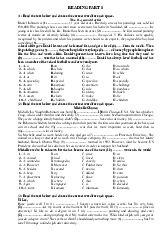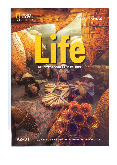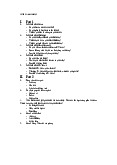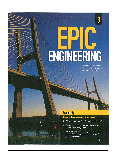






Preview text:
(Đề thi bao gồm
trang, kể cả PHIẾU TRẢ LỜI.) __6 __
TRƯỜNG ĐẠI HỌC NGÂN HÀNG TP. HỒ CHÍ MINH
KHOA NGOẠI NGỮ
ĐỀ THI KẾT THÚC HỌC PHẦN
Tên học phần: TIẾNG ANH – ĐỌC 2
Thời gian làm bài: 45 phút (không tính thời gian phát đề)
Hệ đào tạo: ĐHCQ Ngày thi: Ca thi:
Sinh viên KHÔNG được sử dụng tài liệu. Cán bộ coi thi không giải thích gì thêm.
Họ tên SV: ............................................................ Mã sinh viên: ................................... Lớp học phần: .................... CB CHẤM THI SỐ BÁO ĐIỂM BÀI THI
(Ký & ghi rõ h CB COI THI ọ tên) DANH
Bằng số
Bằng chữ
Thứ nhất:
Thứ nhất: Thứ hai: Thứ hai:
Điểm chi tiết (do CB chấm thi ghi): -Chấm 1: -Chấm 2:
o Số câu đúng: ……….
o Số câu đúng: ……....
o Điểm: ……………….
o Điểm:……………….
Đề thi gồm 30 câu trắc nghiệm. Sinh viên trả lời bằng hình thức viết đáp án (A/B/C/D) vào phần phiếu trả lời.
PHIẾU TRẢ LỜI: Part 1 (20 pts) Part 2 (30 pts) Part 3 (50 pts) 1 1
A Reading Text 1 (25 pts) 2 2 1 3 3 2 4 4 3 5 5 4 6 6 5 7 7
B Reading Text 2 (25 pts) 8 8 1 9 9 2 10 10 3 4 5 1 (Đề thi bao gồm
trang, kể cả PHIẾU TRẢ LỜI.) __6 __ NỘI DUNG ĐỀ THI: PART 1 (20 pts)
Look at the text in each question. What does it say? Write the correct letter A, B or C on your answer sheet. 1. CITY BUS SERVICE
PLEASE HAVE THE EXACT FARE READY FOR YOUR JOURNEY AS THE DRIVER IS UNABLE TO GIVE ANY CHANGE.
A. All city bus journeys cost the same.
B. You need the correct money for the bus.
C. Your ticket could be checked. 2. NO DIVING
EXCEPT IN THE DEEP END OF THE POOL.
A. The water is not deep enough for diving.
B. You must not swim when people are diving.
C. You must not dive where the water is shallow. 3. SECURITY
ALL EMPLOYEES MUST CARRY THEIR IDENTITY CARDS WITH THEM AT ALL TIMES.
A. You must always have your identity card with you.
B. You must show your identity card at all times.
C. You can get your identity card from security. 4. MESSAGE
Dave, no milk left. I’ll get some on my way home. Buy some eggs and tell Mary to make herself a salad.
Dave's Mum wants him to get some A. salad. B. bread. C. eggs. 5. EMAIL T – o: all maths students From: The secretary
This week’s lecture will be in the main hall, and not in the library as usual. Next week the lecture
will be in the library, as normal. Please don’t be late.
A. The time of the lecture has changed.
B. The subject of the lecture has changed.
C. The location of the lecture has changed. 6. PIZZA PALACE
THERE IS A MINIMUM CHARGE OF £4.00 BETWEEN 12:30 AND 2 PM.
A. Everybody has to pay at least 4 pounds between 12:30pm and 2pm. B. A pizza costs 4 pounds.
C. No pizzas are served between 12:30 and 2 pm. 2 (Đề thi bao gồm
trang, kể cả PHIẾU TRẢ LỜI.) __6 __ 7.
PASSENGERS MUST HOLD A VALID TICKET.
ANY PASSENGER WITHOUT A VALID TICKET WILL BE REQUIRED TO PAY AN IMMEDIATE FINE OF £10.00.
A. If you travel without a ticket you may have to pay 10 pounds later.
B. The price of a ticket is 10 pounds.
C. If you don't have a ticket, you will have to pay 10 pounds on the spot. 8. MESSAGE
Maria, your sister phoned. She can’t meet you tomorrow because she has some problems. She wants you to phone her.
How should Maria react? A. Send her sister an email. B. Write to her sister. C. Call her sister. 9. Hi,
I got to the hotel really late, got car trouble. Everything is OK now. I’ll relax a bit today, then do
some shopping tomorrow. See you on Sunday. Lots of love Lenny
A. Lenny has to go back tomorrow. B. Lenny had a difficult day.
C. Lenny is going on holiday on Sunday. 10. EMAIL T – o: Nabil From: Miriam Hi
The new printer you repaired is not working very well. The paper keeps getting blocked. I don’t
know whether to buy a new one or wait for you to sort it out. I really need to print some stuff
urgently. Please let me know when you will be able to come. Regards.
What does Miriam want Nabil to do? A. Buy her a new printer.
B. Tell her when he will come. C. Repair her old printer. PART 2 (30 pts)
Look at the following text. Choose the best option to fill in each blank. Write the correct letter A, B,
C, or D on your answer sheet. Exam Tips
When the day comes, (1)_____ yourself plenty of time to do everything: have breakfast (2)_____ don't
drink too much; go to the toilet; arrive on time, but not (3)_____ early or you will find yourself getting
more and more nervous while you wait to start.
In the exam, calm yourself down by breathing deeply and (4)_____ positively. Read the exam questions
carefully and underline all of the key instruction words (5)_____ indicate how the questions should be
answered. If (6)_____ start with the ones you can do easily to give you (7)_____. Remember what you've
learnt from practising questions and doing mock exams previously and plan your use of time. Don't panic if 3 (Đề thi bao gồm
trang, kể cả PHIẾU TRẢ LỜI.) __6 __
everyone around you (8)_____ to start writing furiously straight away and don't be tempted to follow their example.
Finally, after the exam, don't join in a discussion about (9)_____ everyone else did, unless you want to
frighten yourself, and drain your self-confidence for the next exam. (10)_____ all, remember that exams
are not designed to catch you out, but to find out what you know, what you understand and what you can do. 1. A. give B. gives C. gave D. given 2. A. so B. nor C. or D. but 3. A. to B. too C. also D. such 4. A. think B. thinks C. thought D. thinking 5. A. of which B. what C. which D. when 6. A. possible B. impossibly C. possibly D. impossible 7. A. confident B. confidence C. confidently D. confide 8. A. seem B. seems C. seemed D. seeming 9. A. if B. this C. that D. how 10. A. Above B. Over C. About D. Almost PART 3 (50 pts)
A. Text 1: Read the following text. For questions 1-5, write the correct answer A, B, C or D on your answer sheet. An eye for detail
Artist Susan Shepherd is best known for her flower paintings, and the large garden that surrounds her para. 1
house is the source of many of her subjects. It is full of her favourite flowers, most especially varieties of
tulips and poppies. Some of the plants are unruly and seed themselves all over the garden. There is a
harmony of colour, shape and structure in the two long flower borders that line the paved path which
crosses the garden from east to west. Much of this is due to the previous owners who were keen gardeners,
and who left plants that appealed to Susan. She also inherited the gardener, Danny. 'In fact, it was really
his garden,' she says. 'We got on very well. At first he would say, "Oh, it's not worth it" to some of the
things I wanted to put in, but when I said I wanted to paint them, he recognised what I had in mind.'
Susan prefers to focus on detailed studies of individual plants rather than on the garden as a whole,
though she will occasionally paint a group of plants where they are. More usually, she picks them and then para. 2
takes them up to her studio. 'I don 't set the whole thing up at once,' she says. 'I take one flower out and
paint it, which might take a few days, and then I bring in another one and build up the painting that way.
Sometimes it takes a couple of years to finish.'
Her busiest time of year is spring and early summer, when the tulips are out, followed by the poppies.
'They all come out together, and you're so busy,' she says. But the gradual decaying process is also part of
the fascination for her. With tulips, for example, 'you bring them in and put them in water, then leave para. 3
them for perhaps a day and they each form themselves into different shapes. They open out and
are fantastic. When you first put them in a vase, you think they are boring, but they change all the
time with twists and turns.’
Susan has always been interested in plants: 'I did botany at school and used to collect wild
flowers from all around the countryside,' she says. 'I wasn't particularly interested in gardening
then; in fact, I didn't like garden flowers, I thought they looked like the ones made of silk or plastic
that were sold in some florists' shops - to me, the only real ones were wild. I was intrigued by the para. 4
way they managed to flower in really awkward places, like cracks in rocks or on cliff tops.'
Nowadays, the garden owes much to plants that originated in far-off lands, though they seem as
much at home in her garden as they did in China or the Himalayas. She has a come-what-may 4 (Đề thi bao gồm
trang, kể cả PHIẾU TRẢ LỜI.) __6 __
attitude to the garden, rather like an affectionate aunt who is quite happy for children to run about
undisciplined as long as they don't do any serious damage.
With two forthcoming exhibitions to prepare for, and a ready supply of subject material at her para. 5
back door, finding time to work in the garden has been difficult recently. She now employs an
extra gardener but, despite the need to paint, she knows that, to maintain her connection with her
subject matter, 'you have to get your hands dirty'. Questions:
1. In the first paragraph, the writer describes Susan's garden as
A. having caused problems for the previous owners.
B. having a path lined with flowers.
C. needing a lot of work to keep it looking attractive.
D. being only partly finished.
2. What does Susan say about Danny?
A. He felt she was interfering in his work.
B. He immediately understood her feelings.
C. He was recommended by the previous owners.
D. He was slow to see the point of some of her ideas.
3. What is Susan's approach to painting?
A. She will wait until a flower is ready to be picked before painting it.
B. She likes to do research on a plant before she paints it.
C. She spends all day painting an individual flower.
D. She creates her paintings in several stages.
4. Why did Susan enjoy studying wild flowers at school?
A. She found the way they adapted to their surroundings fascinating.
B. She used the lessons as a good excuse to get out of school.
C. She was attracted by their different colours and shapes.
D. She wanted to learn how to make copies of them in material.
5. What point is Susan making in the final paragraph?
A. It's essential to find the time to paint even if there is gardening to be done.
B. It's important not to leave the gardening entirely to other people.
C. It's good to have expert help when you grow plants.
D. It's hard to do exhibitions if there are not enough plants ready in the garden.
B. Text 2: Read the following text. For questions 1-5, write the correct answer A, B, C or D on your answer sheet. Business Golf
In a hotel conference room, a presentation is taking place. David Stoney is talking to a group para. 1
of around 60 bankers on how to improve their performance. He shows several OHTs with
diagrams and charts and even refers once or twice to psychological theory. It seems a typical
business presentation except for one thing. He is talking about golf.
Attending a presentation like this is not a waste of time because golf outings have
traditionally been an important method of corporate entertainment. Now a large number of para. 2
companies are sending their young executives to business golf experts to learn the art of making
a good impression on the golf course. The sessions deal with questions like ‘When do you talk
business on the golf course?’ as well as giving training in the rules of the game and a few practical
sessions. ‘I want them to try to close million dollar deals’ says one senior marketing manager 5 (Đề thi bao gồm
trang, kể cả PHIẾU TRẢ LỜI.) __6 __
whose sales staff have recently completed a 5-hour golf seminar. ‘A lot of those deals are going
to be made on the gold course.’
According to David Stoney, playing a game of golf is very similar to working in business. para.3
When you play golf, you have to set yourself targets and reach them with the lowest possible
number of strokes, just as in business you have to reach them at the lowest cost. You can find
unexpected problems, just like the bunkers. And of course, in both business and golf, you have to
know how to dress, what to say, the rules of the game and the etiquette (that is, the correct way of behaving).
If you are organising the corporate golf day out (or outing), then attention to detail is very
important. Comfortable travel arrangements, attractive facilities and bars where you can get cold para. 4
drinks can all help to make that day a success. A souvenir gift such as a CD is also a nice idea.
Ultimately, organisation is the key to getting that business deal.
And when should you actually get down to business? If you are the host, David Stoney does
not recommend starting to discuss business on the golf course, especially if it is your first gold para. 5
outing. It is better to let the customer start discussing the subject, or, if they don’t, mention it at the meal afterwards. Questions:
1. Which paragraph gives advice on organising a day out playing golf? A. paragraph 2 B. paragraph 3 C. paragraph 4 D. paragraph 5
2. Who compares golf and business?
A. an executive at a golf course B. a speaker at a conference
C. a general manager of a hotel D. a sales manager
3. Why do many businesses want their young managers to attend business golf sessions?
A. to learn how to make a good impression on the golf course
B. to learn how to become a successful winner on the golf course
C. to learn how to make a good impression on their own boss and staff
D. to learn how to become a general manager of the company
4. Which of the following sentences introduces the subject of the rest of the paragraph?
A. “In a hotel conference room, a presentation is taking place.” (para. 1)
B. “The sessions deal with questions like ‘When do you talk business on the golf course?’ as well as
giving training in the rules of the game and a few practical sessions.” (para. 2)
C. “If you are organising the corporate golf day out (or outing), then attention to detail is very important.” (para. 4)
D. “You can find unexpected problems, just like the bunkers.” (para. 3)
5. When should an executive start to discuss business?
A. before a game of golf starts
B. at a meal after a game of golf
C. after a meal before a game of golf D. during the break
THIS IS THE END OF THE TEST .
Những lưu ý: - Sinh viên không được sử dụng tài liệu 6 (Đề thi bao gồm
trang, kể cả PHIẾU TRẢ LỜI.) __6 __
-----------------------------------------
(Phần này không in trên đề thi)
Người duyệt đề theo quy định
Giảng viên ra đề
Đào Nguyễn Anh Đức 7




